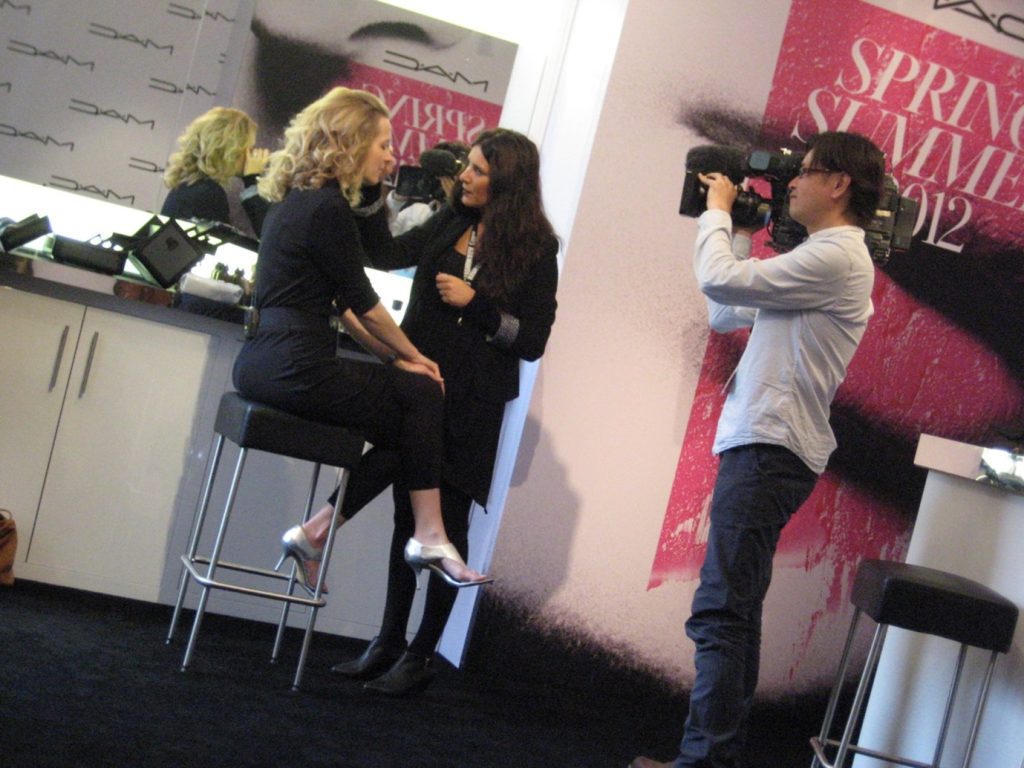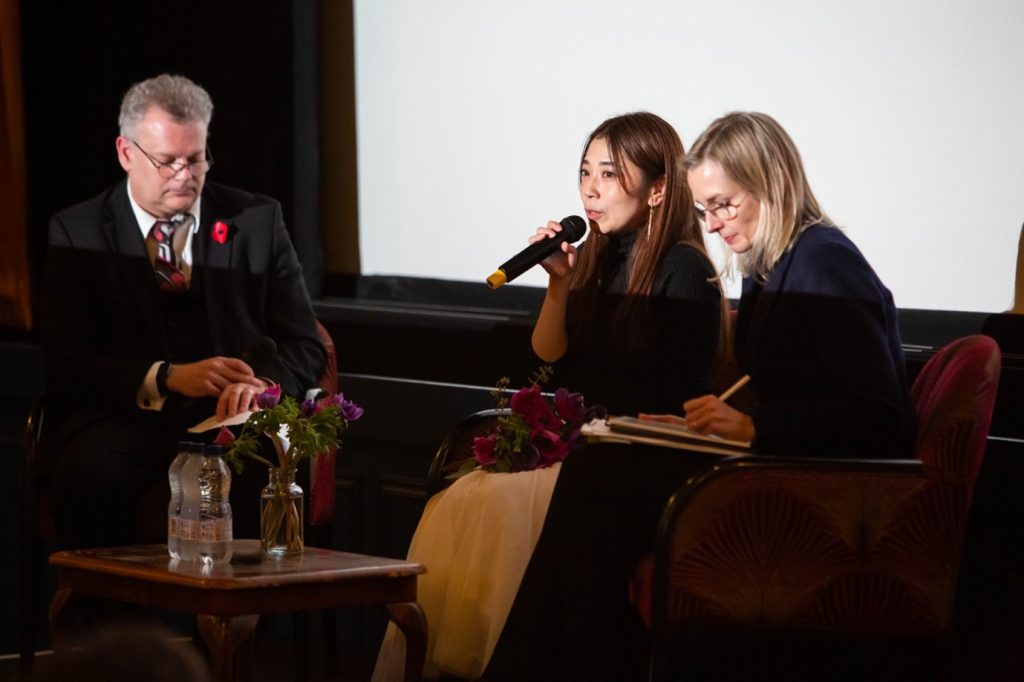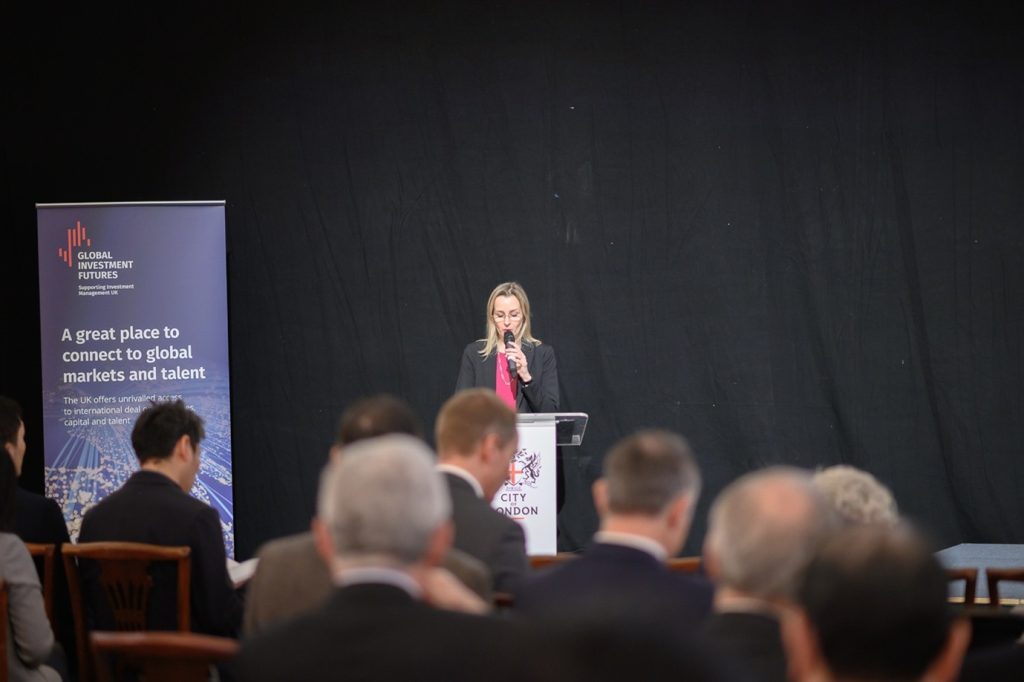The Blonde Interpreter – Part 5
I tend to split the work I do nowadays into “events” and “business”. These are broadly defined categories, and not everything I do fits into one or the other; indeed, some assignments feature a bit of both. I consider myself very lucky to get to do so much on-stage interpreting. Events, by their very nature, have an audience, and every audience member impressed with the interpreter is a potential recommendation, if not client. That’s partly how I’ve ended up working so much in the field of culture and the arts – one things leads to another.
I have interpreted for events for Japan House London, the British Film Institute, the Barbican, the London Symphony Orchestra, and The Embassy of Japan in the UK as well as various art galleries and film and literature festivals. I have been the voice of movie directors and producers, writers, artists, musicians and historians, craftspeople, priests, and sportspeople. I know many of my conference interpreter colleagues prefer to be safely out of the limelight in a booth at the back of the room, but I really don’t mind being on stage. If you’ve read previous instalments of The Blonde Interpreter, you can probably see why. I love getting the speaker’s message across in a way that elicits the intended response from the audience, and getting immediate feedback in the form of a laugh, a gasp, or just the magical sense of connection that sometimes forms when all the elements of an event are just right.

One of my first, and longest-standing, clients, who came to me via word of mouth, was a small anime distribution company in Scotland. They were inviting the director and producer of a film they were distributing to Comicon in London and needed an interpreter. I knew next to nothing about anime at the time, despite having written my MA dissertation on the dubbing of Ghibli films, but since that’s pretty much the starting point for an interpreting assignment on any new subject, I didn’t let it stop me. When I showed up at Comicon at the Excel Centre in London, I felt like I was the one in fancy dress among the hoards of cosplayers. I had come as “30-ish year-old interpreter trying to make a good impression”. From what I’ve heard, cosplayers in Japan show up to events like these with their suitcases and get changed on site, but in the UK they travel from their lodgings in costume, and for a few days the trains leading to the venue are full of superheroes and anime characters. My first Comicon was quite an eye-opener!
I muddled my way through, learning a lot in the process, and I have been working with Anime Ltd ever since as they expanded their business, started their own anime festival in Scotland (“Scotland Loves Anime”), invited bigger and bigger names to the UK, including Makoto Shinkai, Mamoru Hosoda, and started putting animated films forward for the Annecy International Animation Film Festival. Often in the UK, interpreting assignments are one-offs. Even “regular” jobs might only happen once every few months, or once a year. We don’t have colleagues in the usual sense of the word, and here, of course, the Japanese interpreting community is much smaller than it is in Japan, whilst consecutive assignments mostly involve working solo. Thus, it is very special when you are able to develop a relationship with a client you work with over and over again, sometimes for years, especially if that means you get to see their business grow and flourish alongside your own.
Sometimes my work could be called glamorous, like the BAFTAs, or last year’s Cannes Film Festival where I accompanied director Hirokazu Kore-eda for two weeks while he sat on the festival jury. I went to fancy dinners, watched films (24 over the fortnight), hung out with famous people, and never once got mistaken for a film star. I even got to dress up for the red carpet on the last night, although the massive handbag containing my notes, electronic dictionary, notebook, pens, iPad and water probably gave away that I wasn’t there to receive any awards! For the ceremony I had to interpret simultaneously for Kore-eda so that he could follow along with the proceedings. The Grand Théâtre Lumière has interpreting booths, as you might expect, and I only very slightly regretted the ballgown and heels as I half-ran from the red carpet up the stairs and through the maze of corridors that led to the booth. Younger me is very happy that I made it there, maybe not as the actress I once had dreams of being, but in just as vital a role.
A lot of the interpreting I do, of course, is nowhere near as headline-worthy. A lot of the time, I’m interpreting in meetings, for a range of Japanese and non-Japanese companies, at every possible level: board meetings, investor relations, technical seminars, factory tours, sales discussions, and buying sessions. Unlike my events work, I think this is probably a list with which most Japanese interpreters working in the UK will be familiar. These jobs tend to be more confidential, of course (although the level of secrecy surrounding the Cannes jury isn’t to be sniffed at, either!).
Technologies developed during Covid mean that more meetings now take place online, which I know has provided more opportunities to some of my colleagues in the UK. In particular, those who don’t mind working anti-social hours have found themselves busy working in the Japan time-zone. My work, though, has retained a strong in-person bias, for which I am grateful.
On the face of it, working on stage at events and sitting at a boardroom table seem very different, which they are, of course. But there are definitely similarities in the way I handle them. These may not apply in every situation, and maybe not to every interpreter. They may also be more applicable to the UK than they are to Japan.
The first similarity reflects the fact that, in every scenario, we are dealing with people. As technology and AI advance, there are more and more options available to clients when it comes to interpreting. They could use auto-generated subtitles. They could converse online via ChatGPT. They could use a pocket translation device. But if I’m there, it means they have chosen to use a human interpreter. Maybe this is through force of habit. Maybe it is because technology isn’t quite there yet when it comes to Japanese interpreting, in particular. Maybe they aren’t aware of the alternatives. But maybe there is something about having a real person in the room (this applies particularly to face-to-face interpreting) that is reassuring, or conducive to doing better business. I hope this is true, and that we can make it work in our favour in the face of inevitable competition from AI in the future.

That is why, in most cases, I believe in trying to interpret with empathy: in trying to convey the passion and personality of the speaker. As human interpreters, when we’re listening to someone speak, we know if they want their audience to laugh or cry. We know if they are trying to convince or cajole. This is just as relevant in a business negotiation as it is in an awards speech. Maybe even more so.
Perhaps, if the speaker is reeling off a list of numbers, there is little in the way of passion involved. And interpreters know only too well that sometimes a presentation is just a formality, with very little emotion invested. But when a businessperson makes the case for investment in their company, or an engineer describes why the proposed technical solution won’t work, they are telling a story, and that’s what I strive to understand and, in turn, tell, whatever the setting.
I also like to feel like a person at the table, not a machine. However brief my time with the clients may be, I will ideally have a chance to talk with them, even if only for a few minutes. Quite apart from the opportunity to ask questions about the content if possible, it lets me familiarize myself with their voices, and reminds them, in turn, of my presence in the room. I feel this is particularly important in my case because I don’t look like what a lot of people expect a Japanese interpreter to look like. I can’t really blame anyone for wondering whether their counterpart accidentally entered the wrong language into Google when searching for an interpreter. But speaking to the Japanese delegation reassures them that I can indeed speak their language, and in turn the non-Japanese participants are also convinced of my Japanese ability, which is something they would not be able to confirm for themselves.
I’m sure some clients and agencies are put off by my obvious non-Japaneseness. That said, I also know that there are situations where my native English accent and ability work in my favour, so maybe it’s swings and roundabouts. It would be interesting to hear what sort of experiences my fellow non-Japanese interpreters have had, both in and outside Japan. I suppose, in a way, it’s the same as what a newcomer in any field experiences – the requirement to prove themselves – and I can easily do that now by way of client testimonials and, thanks to Covid, an archive of online videos that demonstrate that I can actually do the job.
It would have been nice to be able share some information about the UK market and how it compares to Japan. Unfortunately, not having worked in Japan that’s difficult to do. There’s more competition in Japan, naturally, and a steadier supply of work for those who can do it. It always takes me aback when I hear of an interpreter in Japan with a different assignment every day of the week – sometimes more than one in a day. That’s unusual in the UK; there just isn’t the demand. I also get the impression that Japanese interpreters in the UK are better paid. It’s still a rare(r) language here, hence we can demand a premium. It’s unusual enough that people tend to be impressed when I tell them what I do. Perhaps this is something that my colleagues in Japan who work with languages other than English also experience.
From the sense I get of the Japanese market, I feel like in the UK there are more smaller agencies, and as a rule they don’t specialize in Japanese, although there are a handful that do. As a result, you’re less likely to get a steady supply of work from a single client and if you plan to survive on agency work it generally pays to be registered… everywhere, at least to begin with.

One great thing about 1) working freelance, and 2) the rareness of the language combination in this country, is that you get asked to do other things that require the ability to speak Japanese. This is how I ended up, soon after I left my full-time job at NEC, working as a presenter for NHK on their global magazine show Chikyū Terebi El Mundo, broadcast nightly on BS1. Every couple of months for the best part of two years I presented short pieces on fun UK trends like molecular mixology, and particularly British events like Beatles Week and Royal Ascot. I reported on the run-up to the 2012 London Olympics, and was given a Kate Middleton makeover in our Royal Wedding special. We would film a report, then on the day of the show we would broadcast live via an iPhone in a pub with sufficiently strong wifi, or even on occasion outdoors in a park. This being over ten years ago, you can imagine how well that worked. The feed would frequently freeze and the studio had a photo of me on standby for when they lost the link. It was fun while it lasted, but after first deciding that it could do without its overseas reporters, the show was canned after another year or so. Since then, I’ve done other bits and pieces of presenting for different TV companies. There was a section about Arsenal football club prior to their Asian summer tour, and a lot of interviews with prominent people working in the fields of the environment and religion amongst others for an internet news channel. Most recently, I presented the New Year’s countdown live from a boat on the river Thames a couple of years ago for a major Japanese broadcaster.
If I remember rightly, my first MC job came courtesy of NHK as well. In fact, I think it predated my TV work. Since then, it’s been something I do ever so often, when a Japanese client wants a British-sounding MC for their UK event, but wants someone with whom they can communicate and who can read and sometimes translate the Japanese script.
I hope this has given you an insight into what it’s like to work as a Japanese interpreter in the UK. That said, I can only ever give you one perspective, and even with such a small number of us working here, everyone you ask will doubtless tell very different story. I hope one day we’ll meet, and I’ll get to hear yours.

Bethan Jones
Bethan is a freelance Japanese-English interpreter based in London, UK. She has been “full-time freelance” since 2010 and alongside interpreting and the odd bit of translation, dabbles in presenting for TV and live events. Her interpreting work spans the areas of business, culture, and beyond, and she has been fortunate enough to work with well-known figures such as Hirokazu Kore-eda, Ryusuke Hamaguchi, Makoto Shinkai, Sayaka Murata and Marie Kondo. https://bethanjonesinterpreter.com/
(Photo credit: Eddie Judd Photography)